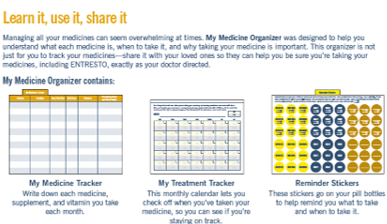Health Problem:
People diagnosed with Congestive Heart Failure take, on average, 8-10 medications everyday.
Situation: People living with heart failure face major polypharmacy challenges, leading to lower adherence rates, more time in the hospital, and lower overall quality of life.
Task: Our clients wanted to drive higher adherence rates for people living with heart failure, so tasked us with designing a large, 12-month long patient support program.
Action: We designed 12 months worth of content, using practices from the world of behavioral science, health literacy, and adult learning.
Among the key objectives for this program, polypharmacy was a key challenge for us to address. To do so, we decided to improve on the most commonly used tools to manage polypharmacy issues: pillbox. However, due to regulatory constraints, we were not permitted to give patients pillboxes.
Undeterred, we decided to create a tool that would support the use of pillboxes, which most patients already had.
Nudge Theory + Health Literacy
Using nudge theory and principles of health literacy, an intuitive, eye-catching, easy to use tool called '“My medicine organizer” became one of the many central pieces that drove the success of the program.
Nudge 2: Easy to follow instructions using multiple learning styles to explain how to properly fill a pill box.
Nudge 3: A hook and magnet were placed on the back to ensure that the organizer could be placed in any location around a patient’s home.
Nudge 1: Tips for patients to involve their caregivers so they can get tangible support from their loved ones.
Nudge 4: Stickers to put on your pill bottles markets “AM,” “PM,” or “AM & PM” to make sure it’s easy to reload your pill box when you get new prescriptions.






